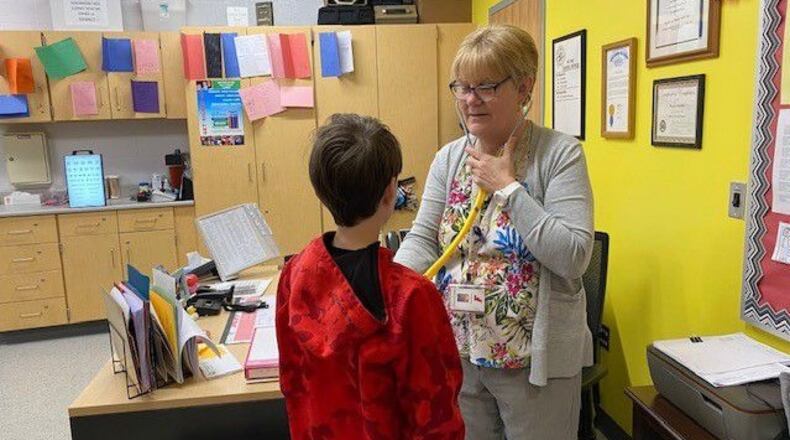From allergies, colds, flu to playground injuries, each school day saw a steady of line of young and teenage students waiting for care and first-aid prior to the onset of COVID-19 in March of 2020.
But after all Ohio K-12 schools were closed in the fearful final weeks of the school year in 2020, school nurses across the region suspected they would be headed into a historic medical storm as schools attempted to re-open and return to some degree of normalcy in fall of that year.
And they were right about their concerns, area school nurses recently said in interviews with the Journal-News.
“We look back now and joke about us being at war in 2020,” said Lakota School Nurse Lisa Brady. “It was nerve racking.”
Now looking back — and as the pandemic appears to be fading from its earlier, more dangerous and at times deadly status - area and state school officials are recognizing school nurses as frontline heroes in 2020, 2021 and into this year in battling both COVID-19 and the fears that swept into classrooms with the virus.
Officials with the Ohio School Board Association (OSBA) recently singled out Lakota’s school nurses – including Brady – among all southwest Ohio school districts with a special award ceremony and dinner to honor their important work through the pandemic.
“Seeing them in action in each of their buildings was inspiring,” said Lakota Board of Education President Lynda O’Connor told the nurses during the OSBA award gathering.
“From performing hearing checks, to caring for our medically fragile students, from providing band-aids to monitoring our students who have been impacted by COVID-19 — and sometimes saving lives — your dedication to our 17,000 students does not go unnoticed and is deeply appreciated,” said O’Connor.
The 2020-2021 pandemic school year was a tense, pre-COVID vaccine time in American schools.
Locally and nationally school officials were scrambling with never-tried-before precautionary measures such as mandatory student and staff masking, social distancing, hybrid class schedules — which saw only half of students attending live classes — virus contact tracing, quarantine procedures that included nurses isolating some students each day into a quarantine room, tending to them as they awaited their parents to rush to school and pick them up.
Before the pandemic, said Brady, a student showing up at the nurse’s office with the sniffles or a cough was often just a prelude to a cold, not a possible and potentially deadly COVID-19 symptom.
“We didn’t know. We just didn’t know,” said Brady, who is the school nurse at Hopewell Early Childhood Center.
“I spent so much time online that summer (2020) before school opened looking at the CDC (Center for Disease Control and Prevention) website and studying the Ohio Department of Health website looking for information because I knew everyone was going to be coming to me with questions.”
“Any cough or sneeze, I knew they were going to be coming to me and I had to be ready. Kids were scared. Teachers were scared. I remember the teachers being so nervous about any student with just general allergies,” said Brady.
The Lead Nurse for the 10,000-student Fairfield Schools — Pam Buehler — is a decade-long veteran of the Butler County school district and looking back she said: “I’ve never been through anything like that.”
On a hypothetical stress scale of one to 10, with 10 being the most stressful, each school day “was an eight to 10,” said Buehler.
“There was a large amount of stress in not only managing the pandemic aspect of it but also still trying to manage our daily clinics – getting our kids’ hearing and vision screenings done – and being able to maintain a sense of stability so parents could come to us as a resource. And putting in long hours too,” she said.
“Caregiving fatigue” was part of the sometimes-overwhelming job, as some school days saw dozens of students identified as possibly infected by the virus. These then launched mandatory and time-consuming contact tracing to find the students who may have been within infection proximity to the student while in classes or elsewhere in the building, she said.
“From an emotional, spiritual and psychological stand point, there was a fatigue of always having to be on top of your game … it was tiring,” said Buehler.
“And even though the COVID-19 was taking priority, we still had to see all the kids coming through. We had to be cautious but we had to also be flexible because things changed on a day-to-day basis.”
“It was a constant state of flux,” she said.
Middletown Schools were among the most aggressive in taking sweeping, early measures — opening the 2020 school year with all remote learning from home — periodically adopting a hybrid class schedule as the pandemic’s infected population spiked at times during the 2020-2021 school year.
Elizabeth Beadle, spokeswoman for the 6,300-student Middletown Schools, looks back and marvels at the healthcare hero role school nurses played.
“It’s exhausting to even remember how much they did during the various peaks of the pandemic,” said Beadle.
“I can’t give enough thanks to our Middletown school nurses. Our nurses tracked COVID-19 cases, cared for students who came down sick at school, covered multiple buildings if another nurse was sick, administered COVID-19 tests and so much more.”
Area school nurses said since March 2020, the current school year, especially the latter half now winding down, has been the closest to the pre-pandemic norm.
“All school nurses deserve so much thanks, appreciation and a restful upcoming summer break,” she said.
About the Author

